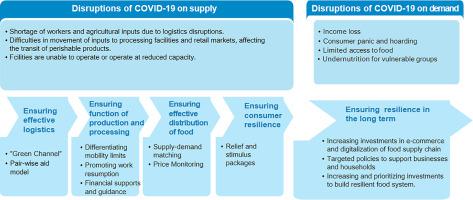Agricultural Systems ( IF 6.6 ) Pub Date : 2021-02-10 , DOI: 10.1016/j.agsy.2021.103102 Yue Zhan 1 , Kevin Z Chen 1, 2

|
CONTEXT
The COVID-19 pandemic continues to spread over the world and has heightened concerns over global food security risks. As the first country hit by COVID-19, China has adopted a series of stringent mitigation policies to contain the spread of virus. This has led to food system disruptions due to restrictions on labor and interruption of transport, processing, retailing, and input distribution.
OBJECTIVE
The objective of this contribution is to report evidence for initial impacts and resilience of China's food system amid the COVID-19 pandemic and to discuss government's responses as well as long-term efforts that promoted resilience.
METHODS
We reviewed a range of publications, government released reports and official information, blogs, and media articles, and whenever possible, we complemented this qualitative information with quantitative data from China's National Bureau of Statistics and finally empirical data obtained from a simulation study.
RESULTS AND CONCLUSIONS
We identified China's earlier responses in each key food system activities including ensuring effective logistics of agricultural products and inputs, supporting production and processing, matching supply with demand, and mitigating consumer's income loss. In particular, innovative information and communications technology (ICT) applications along the food system had been highlighted. Coupled with China's long-term efforts in investing in agriculture, building emergency response systems, and adopting governor's responsibility mechanisms, there has been little panic in the food system with largely sufficient supplies and stable prices. In the second quarter of 2020, after registered negative growth in the first quarter, primary agriculture grew by 3.4% and the negative growth of livestock production was narrowed significantly by 8.7 percentage points. Food prices rose by a modest 0.6% and returned to normal after a surge in February 2020.
SIGNIFICANCE
We expect that China's experiences on building resilient food systems could improve understanding of the challenges posed by COVID-19 from a retrospective perspective and provide lessons to other countries that are experiencing disruptions in the food systems worldwide. The lessons are also important for strengthening the resilience of food systems over longer time horizons.



























 京公网安备 11010802027423号
京公网安备 11010802027423号